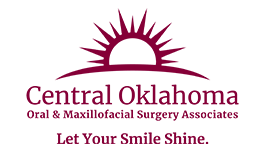04 Jan Protruding Lower Jaw: What are my options?
 The lower jaw, or mandible, is essential to oral function. The lower mandible is connected to the temporomandibular joint (TMJ) and these two hard tissues work together to facilitate all mouth movement—from eating to speaking. Additionally, the positioning of the lower jaw affects more than oral function; it affects one’s appearance. When the position of the jaw and the way it connects to the TMJ causes a protruding jaw, our oral surgeon may recommend jaw surgery to improve overall oral health, promote smooth and comfortable oral function, and balance one’s appearance.
The lower jaw, or mandible, is essential to oral function. The lower mandible is connected to the temporomandibular joint (TMJ) and these two hard tissues work together to facilitate all mouth movement—from eating to speaking. Additionally, the positioning of the lower jaw affects more than oral function; it affects one’s appearance. When the position of the jaw and the way it connects to the TMJ causes a protruding jaw, our oral surgeon may recommend jaw surgery to improve overall oral health, promote smooth and comfortable oral function, and balance one’s appearance.
How does a protruding jaw affect oral health?
When the lower jawbone is positioned improperly, it can greatly affect the health of all oral structures. Also called a malocclusion (a bad bite), a protruding jaw can lead to untimely tooth wear. This is because the upper and lower sets of teeth will scrape against each other during mouth movement—especially when chewing and tearing food. The scraping of teeth will cause cracks in tooth enamel, exposing the softer dentin structure of teeth to breakage and cracking. Tooth wear requires restorative dental treatments such as the placement of dental crowns or fillings.
In addition to tooth wear, a protruding lower jaw can greatly strain the TMJ and facial muscles, both of which help hold the mouth in place. An incorrectly positioned jaw will cause the TMJ and supportive tissues to become strained. A strained TMJ and its supportive muscles and ligaments can cause facial pain, headaches, and even affect smooth movement of the mouth. In severe instances, TMJ dysfunction caused by a protruding jaw can lead to a patient being unable to open or close his or her mouth for periods of time.
How does jaw surgery help?
For those whose oral health is greatly affected by an ill positioned mandible, jaw surgery can be a life-changing treatment that improves comfort and protects teeth from further damage. Essentially, jaw surgery will involve our oral surgeon correcting the placement of the lower mandible and how/where it connects to the TMJ.
If your dentist or physician has referred you to our practice, call our friendly and helpful team today at Central Oklahoma Oral & Maxillofacial Surgery Associates to reserve a consultation with one of our skilled surgeons.
